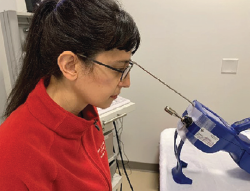Efforts to increase patient comfort with overlapping surgery and surgical training should include strategies to address past negative experiences and foster trust in trainees and the delegation process.
Caliper Measurement a Reliable Assessment Tool Following Pediatric Cranial Reconstruction
Caliper measurements are a simple and reliable way to assess cranial vault proportionality with growth after cranial vault reconstruction

Office Laryngoscopy Is Not Aerosol Generating When Evaluated by Optical Particle Sizer
Is office laryngoscopy an aerosol-generating procedure (AGP), and how can aerosolizing potentials in invasive otolaryngological interventions be critically assessed?
Pediatric Otolaryngologic Clinical Trial Patterns Underscore Increased Representation Opportunities
Continued focus on pediatric otolaryngologic clinical trials enables improved representation of the specialty’s spectrum of disease and therapy, while increased results publication and federal funding may advance patient care.
Transoral Laser Microsurgery Favored Over Radiotherapy in T1 Glottic Carcinoma Survival
Transoral laser microsurgery is associated with better outcomes than radiotherapy in overall survival, confidence interval, disease-specific survival, and laryngeal preservation in patients with T1 glottic carcinoma.
Electrode Configuration Impacts Stability of Nerve Monitoring Signal During Thyroid Surgery
A look at the impact of positioning or head manipulation during thyroid surgery on two different commercially available recording electrode arrays.
Endolymphatic Shunt Surgery Comparable to Intratympanic Gentamicin in Controlling Vertigo in Ménière’s Disease
Endolymphatic shunt surgery provides successful vertigo control at least as well as ITG, with a lower incidence of audiovestibular complications
Olfactory Fluctuation Presence Is Significant Within a Clinical Context
Olfactory fluctuation is mostly associated with sinonasal disease and elevated Sniffin’ Sticks scores, and its presence is valuable information when used in clinical context in a patient workup.
Neurologic Comorbidities and Failure to Thrive Associated with Unsuccessful Decannulation After Pediatric Tracheostomy
A look at the factors most significantly associated with successful decannulation and long-term outcomes in children undergoing tracheostomy.
Infant Tracheotomy Decannulation Status Based on Indications for Procedure
For pediatric tracheotomy patients under years of age, the likelihood of and time to decannulation varies based on indication for the tracheostomy.
- « Previous Page
- 1
- …
- 33
- 34
- 35
- 36
- 37
- …
- 98
- Next Page »